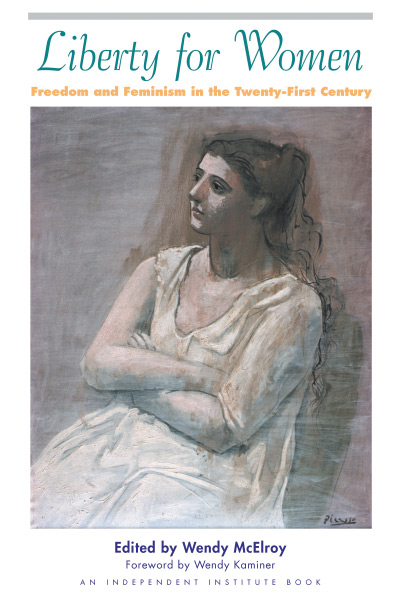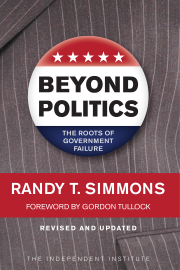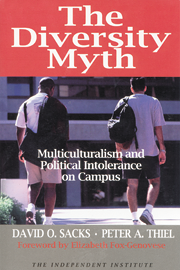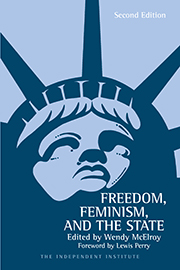| List Price: | ||
| Price: | $15.00 | |
| Discount: | $15.00 (Save 50%) |
| Formats |
Paperback |
Hardcover |
| List Price: | ||
| Price: | $15.00 | |
| Discount: | $15.00 (Save 50%) |
| Formats |
Paperback |
Hardcover |
Overview
The movement for women’s rights arose in the early 19th century as an off-shoot of abolitionism, the anti-slavery movement that declared each human being to be a self-owner. As with other abolitionists, the early feminists were individualists who drew inspiration from the Declaration of Independence and its principles of individual rights and responsibility.
With this vision of individualist feminism, Liberty for Women boldly explores a wide range of issues that confront the modern woman, including self-defense, economic well-being and employment, sex and abortion, the family, technology, and much more. This new feminism asserts the rights of consenting adults to their own sexuality, opposes censorship, and defends every woman’s right to self-defense. It champions competitive markets as the vehicle for women’s economic rights and prosperity. Acknowledging the dangers of technology, the book celebrates its possibilities and defends reproductive rights. And yet, it also defends the validity of choosing traditional values (e.g., to be a “stay-at-home mom”) for those who find satisfaction in doing so.
Liberty for Women is an eye-opening book that vividly charts a new feminism for the 21st century in a highly lucid, provocative, and inspiring way. “Choice” is the key, and every woman’s choices and expressions of self-ownership must be equally and legally respected, from housewives to CEOs. Only then can a meaningful debate arise over which choices may be the best ones for women to make freely.
Contents
Foreword
Wendy Kaminer
Section I. FOUNDATIONS
Chapter 1: Introduction
Wendy McElroy
Chapter 2: Individualist Feminism in the 21st Century
Camille Paglia
Chapter 3: Liberty and Feminism
Richard A. Epstein
Section II. WOMEN AND SEX
Chapter 4: Women and Pornography
Nadine Strossen
Chapter 5: For Their Own Good
Norma Jean Almodovar
Chapter 6: Whether from Reason or Prejudice
Martha C. Nussbaum
Section III. WOMEN AND THE FAMILY
Chapter 7: Chairing the Department: A Matriarchal Paradigm
Mimi Gladstein
Chapter 8: Fetal Rights
Ellen Frankel Paul
Chapter 9: Abortion and Liberty
Alexander Tabarrok
Section IV. WOMEN AND WORK
Chapter 10: Groping Toward Sanity
Cathy Young
Chapter 11: Comparable Worth
Ellen Frankel Paul
Chapter 12: Affirmative Action
Wendy McElroy
Section V. WOMEN AND VIOLENCE
Chapter 13: Women and Violent Crime
Rita Simon
Chapter 14: Disarming Women: Comparing “Gun Control” to Self-Defense as Protection for Victims of Domestic Abuse and Violent Crime
Richard W. Stevens, Hugo Teufel III, and Matthew Y. Biscan
Section VI. WOMEN AND TECHNOLOGY
Chapter 15: Breeder Reactionaries: The War on New Reproductive Technologies
Wendy McElroy
Chapter 16: I Am in Mourning
Lois Copeland
Chapter 17: The Official Plan to Eliminate the Midwife, 1899-1999
Faith Gibson
Chapter 18: The 3rd WWWave—Who We Are, What We See
Janis Cortese
Index
Detailed Summary
- A New Feminism. The world is hearing a new voice—that of individualist feminism, which embraces the values of personal choice and responsibility. LIBERTY FOR WOMEN is that voice, and authors in the book:
• Reject victimhood • Defend reproductive rights • Embrace men as full and valued partners • Defend domesticity as well as monetary work as respectable feminist goals • Oppose censorship and laws restricting the sexual relations of consenting adults • Support each woman’s right to self-defense and gun ownership • Decry gender-based laws (affirmative action, comparable worth, gender-based licensing and employment laws, etc.) • Celebrate freely competitive markets and technology
Unlike “gender” feminists, for whom gender conflict is ubiquitous, individualist feminists reject the notion that women and men are politically-separate, antagonistic classes or that government should favor one gender over the other. Individualist feminism calls for universal emancipation from government oppression and privilege, stale traditions, and politically-correct orthodoxies. It raises, once more, the banner of “choice” and seeks to advance civil society through nonpolitical means, such as education, moral suasion, non-violent protest, and the repeal of destructive laws.
- Violence against Women. As with all violence, violence against women is unacceptable, but feminists like Andrea Dworkin who talk about an “epidemic of murders of women” grossly distort the facts. The most prevalent victims of violent crime are young black men, not women. The homicide rate for young white women is 3.4 per 100,000, and for black women and white men of the same age it is 14.3 and 14.5 respectively, more than four-times higher, but for young black men it is 117.1, 34 times that for white women!
- Self-Defense. Despite their concern with preventing violence against women, many feminists advocate restrictions on gun ownership that weaken a woman’s ability to defend herself. More than 92% of the time when a gun is used defensively, the defender succeeds without firing a shot or by firing a warning shot only. The inadequacy of government-provided security (e.g., slow 911 emergency response) makes self-defense all the more necessary.
- Abortion. A woman has the right to control everything within her own skin. Every year, an estimated 46 million women worldwide, or 35 of every 1,000 women of child-bearing age, have an abortion. In 1873, the infamous Comstock Act criminalized the mere distribution of information about abortion and birth control, and the 1996 Telecommunications Act attempted to extend the Comstock prohibitions to the Internet.
- Economic Empowerment. Ending government regulatory and tax burdens liberates women to fully develop and utilize their talents, pursue non-traditional high-paying jobs, start new businesses, invest wisely, and choose among viable business and family options. “Comparable worth” laws encourage women to stay in lower-paying jobs that reinforce stereotypes and intensify competition for traditionally “female” jobs.
- Midwifery. Women should have the freedom to choose the circumstances under which they give birth and to have midwives assist them. The United States spends more than any other country on childbirth (per capita) but ranks very near the bottom of industrialized countries in perinatal mortality, even though physicians are present at 95 percent of the births. In the five countries rated “best,” midwives—not physicians—are present at most births. Yet lawmakers, at the urging of the medical establishment, have criminalized midwifery.
- Pornography and Prostitution. As long as everyone involved is a consenting adult, the law should not intrude into these personal choices. Feminists should work for the legal protection of sex workers and First Amendment rights against censorship.
- Sexual Harassment. Two years after the Clarence Thomas-Anita Hill controversy mainstreamed all-encompassing definitions of what constitutes sexual harassment, the U.S. Supreme Court adopted the approach advocated by gender feminist Catherine MacKinnon, which treats sexual harassment as actionable discrimination under Title VII of the 1964 Civil Rights Act. The resulting arbitrary regime of workplace etiquette discourages people from resolving personal conflicts on their own and encourages them to snitch on others and use laws and regulations to settle personal scores. Adopting a common law tort and contract approach to sexual harassment would require such claims to involve actual harm to the aggrieved party.
Rooted in the 19th century anti-slavery movement of abolitionism, individualist feminism is based upon the view that all human beings have a right to their own person and property. Individualist feminists consistently apply the principle of “a woman’s body, a woman’s right” to every issue that confronts women today.
LIBERTY FOR WOMEN: Freedom and Feminism in the Twenty-first Century, edited by Wendy McElroy (Research Fellow, The Independent Institute) brings together the perspectives of eighteen scholars, lawyers and activists. Shedding light on topics as diverse as marriage, abortion, midwifery, pornography, prostitution, affirmative action, fetal contracts, sexual harassment, comparable worth, technology, armed self-defense and legal reform, LIBERTY FOR WOMEN presents a wealth of ideas and information to anyone interested in women and society.
In the book’s foreword, Wendy Kaminer (The American Prospect and The Atlantic Monthly) explains that LIBERTY FOR WOMEN shows that choice is central to women’s empowerment. The centrality of choice in individualist feminism is examined in the “Foundations” section of the book, with chapters on history, law, ethics and culture provided by LIBERTY FOR WOMEN editor Wendy McElroy, legal scholar Richard Epstein (University of Chicago), and Camille Paglia (University of the Arts).
Women and Sex
Individualist feminism is sometimes misidentified as a “conservative” tradition because it champions freely competitive markets. But unlike conservatives (and feminists of the Dworkin-MacKinnon variety) individualist feminists defend the freedom to choose in all aspects of life, including pornography and prostitution. Accordingly, Nadine Strossen (president, American Civil Liberties Union) examines the dangers of pornography laws, such as the Canadian Supreme Court’s decision in Butler v. The Queen (1992), and notes that sexual expression is conspicuously absent in totalitarian regimes. Prostitutes’-rights activist and former call girl Norma Jean Almodovar blends cogent arguments for sex-worker rights with the passionate rhetoric of one who has personally experienced the abuses of law enforcement. Law and ethics professor Martha C. Nussbaum (University of Chicago) brings a dispassionate philosophical and cultural analysis to the subject of taking money for bodily services, showing that criminalization of prostitution greatly increases violence against women.
Women and the Family
Individualist feminism defends the choice to enter into traditional marriages or unconventional ones. Mimi Gladstein (University of Texas at El Paso) relates how the managerial skills she learned as a mother were the same ones she used to manage an English department, much to the chagrin of male colleagues. Ellen Frankel Paul (Bowling Green State University) offers a free-market analysis of “fetal rights,” placing this legal concept into a framework of “freedom of contract.” Alexander Tabarrok examines abortion from a legal, historical, economic and moral perspective, and places it in the broader context of the right to choose.
Women and Work
Feminism has made highly visible inroads into the workplace. Wendy McElroy applies free-market economic principles to affirmative action and argues that it damages both the workplace and the educational system. Cathy Young (Reason Magazine and Boston Globe) brings common sense to bear on sexual harassment in the wake of Clinton’s sex scandals. Ellen Frankel Paul analyzes one of the more tyrannical workplace proposals—“comparable worth”—and explains why the idea is unworkable and badly flawed in its very conception.
Women and Violence
Rita J. Simon (Women’s Freedom Network and University of Maryland) corrects many of the errors and assumptions of feminist statistics on violence and women to reveal a more accurate picture. Attorneys Richard W. Stevens, Hugo Teufel III and Matthew Y. Biscan cogently argue that women should empower themselves through self-defense with firearms rather than rely on government, which tragically fails millions of victims every year.
Women and Technology
Wendy McElroy challenges the current feminist rejection of the new reproductive technologies, arguing instead for the liberating nature of medical progress in these areas. Lois Copeland, M.D., expresses her frustration at being unable to offer the best medical care and consultation to patients because of governmental interference. Faith Gibson (California College of Midwives) examines how male obstetricians conspired with government regulators to eliminate competition from midwives—despite the fact that midwives have always had better records of safety than obstetricians (a fact still true today). Janis Cortese (3rd WWWave) explains “third-wave” feminism, and why a rebellious, pro-technology, pro-sex new generation.
LIBERTY FOR WOMEN is an eye-opening book that vividly charts a new feminism for the 21st century in a highly lucid, provocative, and inspiring way. “Choice” is the key, and every woman’s choices and expressions of self-ownership must be equally and legally respected, from housewives to CEOs. Only then can a meaningful debate arise over which choices may be the best ones for women to make freely.
Praise
“Liberty for Women is likely to provoke both left-wing feminists and right-wing traditionalists. It is lively and provocative and adds immensely to the debate on the role of women in contemporary life.”
—Linda L. Chavez, President, Center for Equal Opportunity, and former Director, U.S. Commission on Civil Rights
“Mainstream feminism long ago ran into a variety of false trails and blind alleys . . . . Liberty for Women offers just the sort of intellectual barbs so sorely needed to jolt a near corpse back into life.”
—Alexander Cockburn, columnist, The Nation and Los Angeles Times
“This outstanding collection of social commentaries and political analyses that make up Liberty for Women reflects the most significant and controversial topics in contemporary gender politics, addressed by some of the best independent minds addressing these issues today. It offers a crash course in progressive positions on women's rights and roles that have not gotten the attention they deserve in women's studies courses. The text's comprehensiveness and accessibility leave no excuse for perpetuation of this gross curricular oversight.”
—Susan Sarnoff, Professor of Social Work, Ohio University
“A recent collection of articles, Liberty for Women: Freedom and Feminism in the Twenty-First Century, presents a thorough discussion of the ifeminist view. Liberty for Women makes strides in showing that treating women as a separate group in need of protection is demeaning and ultimately harmful to women's interests. In order to persuade readers of their free-market/individualist points of view, the articles' authors must confront the likely response of the other side. For some topics, the authors' logical arguments are buttressed by statistics and anecdotal evidence. For others, however, the reader must take Liberty for Women's arguments on faith. Even so, the book presents arguments that those concerned with women's issues should not dismiss or discount out of hand. . . . Liberty for Women makes powerful and persuasive arguments that should reframe the women's issues policy debate. . . . Ifeminism stands in contrast to radical feminists. Ifeminism attempts to return the feminist movement to its earlier roots—the ideas of the abolitionist-suffragettes—coupled with a modern understanding of how markets work. Ifeminists believe individuals, including women, make the best decisions for themselves and encourage women to 'vigorously oppose all special protections of women... as inherently infantilizing'. . . . Liberty for Women provides convincing evidence that providing women with greater freedom to pursue the literature, work, and self-defense methods of their choice maximizes their welfare. . . . Liberty for Women provides evidence justifying the removal of governmental barriers to women's employment.”
—Michigan Law Review
“There is an unwritten rule among many feminists: Only women on the political left have the right to interpret the lives of women. This unique and important, new book breaks that rule and provides an excellent forum for civil libertarian thinkers. Liberty for Women is a matchless book on the most important issues facing women now and in the future.”
—Christina Hoff Sommers, Resident Scholar, American Enterprise Institute; author, Who Stole Feminism? How Women Have Betrayed Women
“<Liberty for Women is a marvelous, incisive, and much-needed book demonstrating that unorthodox feminists are alive and well outside the rigid confines of women’s studies programs. This intelligent and challenging book has an important role to play in both classroom and public policy discussions.”
—Daphne Ptai, Professor, University of Massachusetts; author, Professing Feminism, Women’s Words : The Feminist Practice of Oral History, Brazilian Women Speak: Contemporary Life Stories, and Heterophobia: Sexual Harassment and the Future of Feminism
“The divisions between libertarian and liberal feminists are not neat or especially consistent (the ideological divides are more readily summarized). Some women champion free markets but not free speech. Some (like me) favor free speech but not free markets. Some, from both camps, want to decriminalize prostitution, while others believe in prohibiting it. Differences like these—the complexities of women’s lib—invigorate this important book, Liberty for Women. Few feminists will agree with every contribution to it; the contributors probably disagree fairly often with each other. But they share a love of liberty that the feminist movement should have the courage to embrace.”
—Wendy Kaminer, former Senior Editor, The American Prospect; Contributing Editor, The Atlantic Monthly; commentator, National Public Radio; author, Fearful Freedom: Women’s Flight from Equality and Women Volunteering
“Women are human beings, and should therefore have the same rights and freedom as all other human beings: This was the fundamental insight of the early generations of feminist pioneers. . . . Liberty for Women is a thought-provoking anthology of freedom-feminist writings. . . . The book is devoted to sketching out an alternative, viewing freedom as the solution to, rather than the cause of, women's problems. . . . This book is a valuable contribution to the cause of freedom, and of feminism properly understood.”
—National Review
“Wendy McElroy knows a lot about the struggle of women to remove legal obstacles to their freedom. . . . In Liberty for Women, she has assembled a number of carefully chosen papers by authors from widely varied backgrounds, ranging from law professors and economists to a former call girl and a midwife. . . . Liberty for Women is an important book. It points that 'all human beings have the same interest in life, liberty, and the pursuit of happiness. All human beings share the same natural rights just as they share a basic biology.'Yet there are some issue that hold special interest to women. . . . As editor Wendy McElroy says, she considers 'voluntary cooperation as the proper basis of society' and 'defends every choice between consenting adults.'”
—Liberty
“This provocative book powerfully demonstrates that feminism is neither monolithic nor homogeneous. The interesting and thoughtful opinions represented here deserve broad dissemination. I hope Liberty for Women becomes a must-read in every women’s studies program in America, and for anyone who is interested in issues of equality and sexual politics.”
—Christie Hefner, Chairman and Chief Executive Officer, Playboy Enterprises, Inc.
“The women’s movement has always had to fight against outsiders’ visions of it as an ideological monolith—Liberty for Women serves proudly as exhibit kajillion and one. Liberty for Women's best chapters are those with the narrowest focus: On pornography, prostitution, gun ownership, abortion, and midwifery, authors make their cases strongly for as little government interference as possible. . . . While these chapters will surely raise the ire of those who disagree, they are well researched, thoughtful, and capable of sparking intelligent debate on all sides of the issues.”
—Bitch
“Thank you for bringing to light more of the history of women fighting for choice. Even though I am a pro-choice activist, I found some very interesting things in Liberty for Women that even I didn't know. The new information you bring to light is important for people on both sides of this sensitive debate to read. I hope they will.”
—Ann E. W. Stone, Co-founder, National Women’s History Museum
“Liberty for Women is a collection of 18 essays on such diverse topics as employment, affirmative action, health care, and violence. Rather than being pure forward thinking, however, these writers step back to a fork in the road of feminism to take the way less traveled. Packaged therefore as a return to roots and beginning from a rubric of the greatest good for the greatest number and basic human rights/civil rights, Liberty for Women is both a defense of normalcy—for example, the right to choose to be a housewife (or prostitute) as long as that choice is not coerced—and a strenuous argument against the hegemony of second-wave or 'radical' feminism. Nowhere is the work more powerful when decrying the excesses of feminist hard-liners who have often failed to advance women's rights and, by redefining tools of repression (e.g., censorship) as 'protecting women,' have actually caused inexcusable losses.”
—Bay Guardian
“Liberty for Women is a superb and stunning assemblage of clear-eyed feminist thinkers. They have staked out the intellectual free-center that clears an avenue between the radical authoritarians of the far left who want to regiment a collectivist conformity and those of the far right who aim to impose a rigid 1950’s consciousness.”
—Sally Satel, W. H. Brady Fellow, American Enterprise Institute; author, PC, M.D.: How Political Correctness Is Corrupting Medicine
“Liberty for Women shows how feminism has evolved from simplistic ideological doctrine to a more relevant and sophisticated analysis of the choices open to women at the dawn of the 21st century. Leading intellectuals offer cogent insights about major issues of concern to women. The volume can also be a useful guideline for women facing similar issues in other countries. I strongly recommend the book to everyone who is interested in a more fundamental approach to feminism.”
—Guity Nashat, Professor of History, University of Illinois at Chicago; author, Women in the Middle East: Restoring Women to History, Middle Eastern History, and The Economics of Life: How Real-World Issues Affect Our Everyday Lives (with Gary Becker)
“Liberty for Women brilliantly explains ‘individualist feminism,’ based on liberty and equal opportunity, as opposed to ‘gender feminism,’ which rests on preferences and group privileges. This fascinating book rehabilitates feminism as a political movement, making it attractive again to the many women who have dismissed its excesses. This book shows that feminism is for everyone who believes in the significance of free choice. With verve and daring, the authors explore the surprising policy implications of true feminism.”
—Judith S. Kleinfeld, Director of Northern Studies and Professor of Psychology, University of Alaska
“Kudos to Wendy McElroy for demonstrating with contemporary authors in Liberty for Women that individualist feminism is robustly alive today. This book and its disparate authors reminds us that a love of liberty underlies America’s most viable and enduring political passions, whether identified as 'left' or 'right.'”
—Joan Kennedy Taylor, late author, Reclaiming the Mainstream: Individualist Feminism Rediscovered, Sexual Harassment, and What to Do When You Don’t Want to Call the Cops
“Liberty for Women is the book that's been missing from university curricula all these years. We always knew there was more to feminist thought than what was on offer. The book's authors remind us of the root cause of the women’s movement: more individual choice.”
—Amity Shlaes, Senior Columnist, Financial Times, author, The Greedy Hand
“Any book endorsed by both Playboy's Christie Hefner and The Nation's Alexander Cockburn is likely to raise eyebrows. The provocative essays gathered by editor McElroy do just that. The writers of these essays identify themselves as 'individualist feminists'—a term some readers will find unfamiliar, but one which best approximates a kind of gender neutral libertarianism. These essayists embrace the mantra of 'freedom of choice' in its broadest sense, drawing intriguing—and often shocking—intellectual connections between the right to bear arms, the pro-choice movement, women's pornography, prostitutes' legal rights and capitalism. The most powerful pieces are those that directly contest the entrenched orthodoxies of essentialist feminism. This book offers much food for feminist thought.”
—Publishers Weekly
“Although the radical and gender feminists have dominated women’s politics in recent years, other types of feminists exist, and Wendy McElroy has gathered some of their writing in Liberty for Women. . . . These 'individualist feminists' deviate from their radical and gender counterparts by refusing to relegate women to a class apart from men. Going further still, they impugn the beliefs that big government—or protests against patriarchy and the free market—can adequately address women's problems. Instead, the individualist feminists argue that natural law 'grounded in or based upon fact' should be employed in addressing these topics, giving the same individual rights and freedoms to everyone. . . . Their work is worth noticing, for it represents a step back from the abyss of radical feminism.”
—The Weekly Standard
“Liberty for Women, edited by Wendy McElroy, advocates individualist feminism, which sees women as adult individuals in charge of their own destinies. . . . The writers in Liberty for Women argue rationally for their point of view, marshaling supporting evidence. The new generation of young women is confident, competent, and self-sufficient They have no intention of being victims. They are feminists.”
—San Jose Mercury-News
“Liberty for Women provides voices for the 'third wave' of feminism, with thoughtful essays on a variety of topics to bring feminism into the 21st century. Liberty for Women expresses ideas from what they see as the third wave of individualist feminism, that sees individual freedom and choice as being pivotal to feminist interests. They believe that laws enacted to 'protect' women as a special class are typically used against them. The book covers a number of different aspects of feminist issues, including fetal protection laws, abortion, affirmative action, and reproduction technologies. This is a though-provoking book that should be a part of any women’s studies curricula, and should be required reading for anyone interested in the law and how it affects women.”
—Sex in Review
“Liberty for Women attempts to steer the next generation toward a libertarian feminism more fitting for the new century. Certainly the ideas espoused in Liberty for Women have a more buoyant, contemporary feel than the jargon-bound and turgid movement the book sets out to challenge. In fact, the ifeminist—tough, independent-minded, and determined to be as comfortable with a dirty joke or a sidearm as a Texas cowboy—has more of a beef with the sisterhood than with the patriarchy. . . . Liberty for Women does offer a much-needed critique of the tradition of centrally planned equality that continues to dominate the thinking both of contemporary academic feminists and in the major women’s organizations. . . . Liberty for Women offers a useful critique of the unintended consequences of the centralized planning embraced by NOW and women's studies departments.”
—The Public Interest
“Liberty for Women is an eye-opening book that vividly charts a new feminism for the 21st century in a highly lucid, provocative and inspiring way. The book offers a vision of contemporary feminism that goes beyond the dominant attitudes of today’s feminist orthodoxy. The provocative writings base their arguments on individual rights and personal responsibility, stirring echoes of the ideological roots of the women’s rights movement. The contributors offer surprising views on a wide range of issues that confront the modern woman, including self-defense, sexual freedom, economic well-being and employment, the promise of technology, and the place of the traditional values, including the family.”
—Libido: The Journal of Sex and Sensibility
Author
Wendy McElroy is a Research Fellow at The Independent Institute. Her other books include The Independent Institute volume, Freedom, Feminism and the State; plus Sexual Correctness; The Reasonable Woman: A Guide to Intellectual Survival; Dissenting Electorate: Those Who Refuse to Vote and the Legitimacy of Their Opposition; XXX: A Woman’s Right to Pornography; Queen Silver: The Godless Girl; and Liberty 1881-1908: A Comprehensive Index. Ms. McElroy was Series Editor for Knowledge Products’ popular audio-tape series, The World of Philosophy, The World’s Political Hot Spots, The United States at War, and The United States Constitution, and she authored the scripts for Vindication of the Rights of Woman and The Liberator, Civil Disobedience, and Discourse on Voluntary Servitude in the Audio Classics Series. A weekly columnist for FOX News.com, she is a contributing editor to several periodicals, the author of numerous articles in various magazines and scholarly journals, and the editor of the popular feminism site, IFeminists.com.
News
| ”Forum sparks tense sexual assault debate“ Research Fellow Wendy McElroy in The Brown Daily Herald | Wed., Nov. 19, 2014 |
















